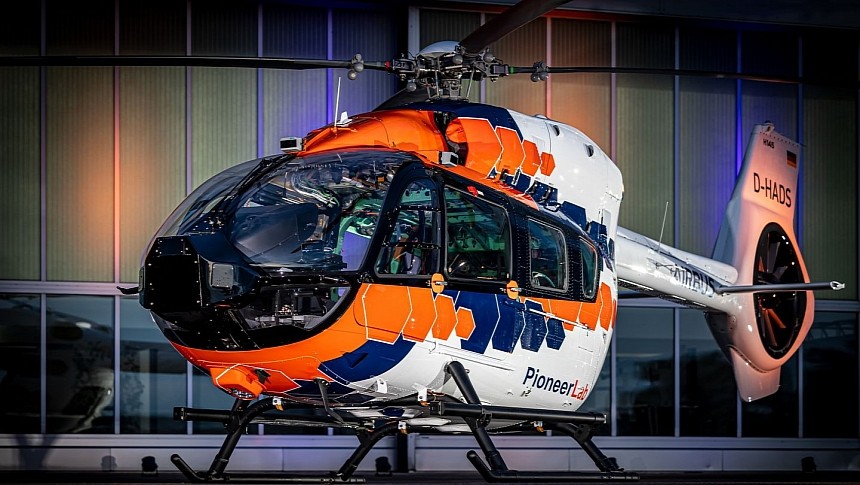The iconic H145 could become up to 30% more fuel efficient through a range of innovations, including hybrid propulsion. Airbus kicked off a testing campaign for these game-changing technologies aboard the new PioneerLab.
PioneerLab is the newest addition to the Airbus series of so-called flying laboratories. Also known as technology demonstrators, these aircraft (in this particular case, helicopters) use conventional platforms for the sole purpose of testing disruptive features and functions. Airbus Helicopters officially introduced this new rotorcraft at the German National Aviation Conference in Hamburg.
PioneerLab is based on the classic H145 platform, and it's dedicated exclusively to twin-engine helicopter technology. One of the main goals is to make these helicopters more sustainable in the future. To achieve that, Airbus plans to increase the use of bio-based and recycled materials for producing structural components. Plus, components will be made using innovative processes that require less energy and increase recyclability.
Testing these new structural components will be one of the PioneerLab's tasks. Other tasks will focus on a higher level of autonomy, which is another key element for tomorrow's improved helicopters.
As a flying laboratory, the PioneerLab will integrate and test a dedicated flight control system plus the associated sensors for autonomy. Thirdly, it will focus on improving safety, particularly during take-off and landing.
The aviation giant didn't waste any time in putting the PioneerLab to work. The new helicopter's first test campaign is already in motion. It kicked off in Donauworth, where Airbus has its largest German site. The campaign began with testing a rotor strike alerting system and will continue with automated take-off and landing features. The RSAS is supposed to warn the onboard crew when there's an imminent risk of collision with the main and tail rotors.
Overall, by combining aerodynamic upgrades with a hybrid propulsion system, Airbus claims the iconic H145 could increase its fuel efficiency by an impressive 30%.
Airbus unveiled the first flying lab in this series at the beginning of 2021. The FlightLab was introduced as a platform-agnostic demonstrator. Being agnostic meant that it could test technologies not just for the entire Airbus helicopter range but even for eVTOLs (electric vertical take-off and landing) or fixed-wing aircraft.
The FlightLab's initial test campaign focused on noise pollution. Innovative research on how buildings can influence people's perception of noise in busy urban centers was used as a foundation for innovative sound modeling to be implemented on future eVTOLs.
The DisruptiveLab demonstrator joined the club in the Fall of 2022 and kicked off its first test campaign at the beginning of this year, with a focus on emission-reducing technology.
The new PioneerLab is partially funded by the Federal German Ministry for Economic Affairs and Climate Actions (BMWK).
PioneerLab is based on the classic H145 platform, and it's dedicated exclusively to twin-engine helicopter technology. One of the main goals is to make these helicopters more sustainable in the future. To achieve that, Airbus plans to increase the use of bio-based and recycled materials for producing structural components. Plus, components will be made using innovative processes that require less energy and increase recyclability.
Testing these new structural components will be one of the PioneerLab's tasks. Other tasks will focus on a higher level of autonomy, which is another key element for tomorrow's improved helicopters.
As a flying laboratory, the PioneerLab will integrate and test a dedicated flight control system plus the associated sensors for autonomy. Thirdly, it will focus on improving safety, particularly during take-off and landing.
The aviation giant didn't waste any time in putting the PioneerLab to work. The new helicopter's first test campaign is already in motion. It kicked off in Donauworth, where Airbus has its largest German site. The campaign began with testing a rotor strike alerting system and will continue with automated take-off and landing features. The RSAS is supposed to warn the onboard crew when there's an imminent risk of collision with the main and tail rotors.
Overall, by combining aerodynamic upgrades with a hybrid propulsion system, Airbus claims the iconic H145 could increase its fuel efficiency by an impressive 30%.
Airbus unveiled the first flying lab in this series at the beginning of 2021. The FlightLab was introduced as a platform-agnostic demonstrator. Being agnostic meant that it could test technologies not just for the entire Airbus helicopter range but even for eVTOLs (electric vertical take-off and landing) or fixed-wing aircraft.
The FlightLab's initial test campaign focused on noise pollution. Innovative research on how buildings can influence people's perception of noise in busy urban centers was used as a foundation for innovative sound modeling to be implemented on future eVTOLs.
The DisruptiveLab demonstrator joined the club in the Fall of 2022 and kicked off its first test campaign at the beginning of this year, with a focus on emission-reducing technology.
The new PioneerLab is partially funded by the Federal German Ministry for Economic Affairs and Climate Actions (BMWK).







